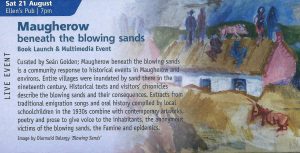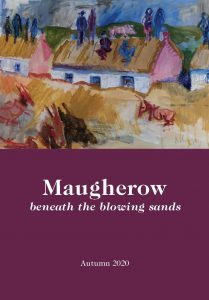after all one writes poetry for
a few careful readers and a few friends …when they can write as well as read, one can sit with
one’s companions under the hedgerow contentedly— W.B. Yeats, Preface to The Countess Cathleen
As part of Sligo’s annual Tread Softly Festival, the Bare Hazel is a new arts participation project launched with the kind support of Sligo County Council Creative Ireland Programme. Writers work with groups of artists from both professional and community backgrounds from County Sligo to create a series of written, visual and musical responses to the landscape.
For the 2020 festival l was asked to organise an event commemorating Maugherow and proposed the following call for contributions:
Blowing sands buried homes and villages in Maugherow in Famine times. Remains survive beneath the sand. Burials and funerals and cemeteries. Passage graves, middens, tombs, souterrains, scalpeens and cillíní — the graves of the unbaptised banned from sacred ground. Emigration, perhaps the Pomano. The gentry and the inhabitants. Visitors’ chronicles. The victims’ silence but for song, recitation and legend. Palmerston’s reach from the bent grass in Ballyconnell to the Opium Wars in China. The sands of time in the time of sands. Text, music new and trad, soundscape and image.
With veterans from last year, we defined this year’s focus and designed a programme for a live event with text, music and artwork. The Covid-19 pandemic lockdown and restrictions on public events and pub openings ruled out this possibility, but having received many texts, artwork, photographs and songs, we decided to edit and publish an innovative book containing the work composed especially for this year’s event, to be distributed in a limited edition free of charge, as we did last year. Extra copies may be obtained here and here. A digital version is available here. To give voice to the inhabitants, the anonymous victims of the blowing sands, the Famine and epidemics, we decided to include extracts from traditional emigration songs that fit this year’s theme and oral history compiled by schoolchildren in the 1930s available at www.duchas.ie, as well as Robert Milne’s ‘Sweet Dernish Island, Adieu’ and the ‘Ballad of the Pomano’. We recruited last year’s participants and sought newcomers.
We took inspiration from the striking metaphor that ends Eibhlín Dubh Ní Chonaill’s eighteenth century Caoineadh Airt Uí Laoghaire, comparing her husband’s tomb to the darkened cells of filí or poets of the Gaelic order who shut themselves inside in darkness to compose and memorise their poetry, emerging later to recite it. She comments ironically that Airt does not enter the darkness to learn or make music, nor emerge again, because he is buried beneath clay and stones. We could do what Airt cannot, descend beneath the blowing sands but emerge again, alive with knowledge and art, song and music, poetry and prose.
Front cover: Blowing Sands, acrylic on paper, by Diarmuid Delargy
ISBN: 978-1-9162280-1-6

